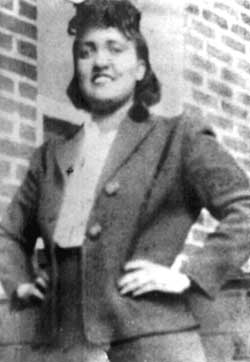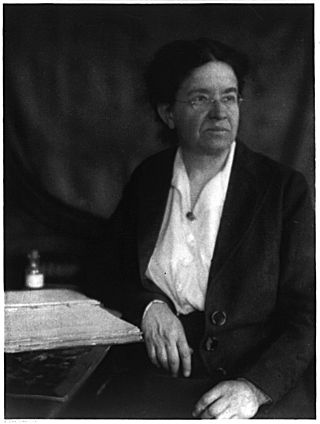
Henrietta Lacks was an African-American woman whose cancer cells are the source of the HeLa cell line, the first immortalized human cell line and one of the most important cell lines in medical research. An immortalized cell line reproduces indefinitely under specific conditions, and the HeLa cell line continues to be a source of invaluable medical data to the present day.

Florence Rena Sabin was an American medical scientist. She was a pioneer for women in science; she was the first woman to hold a full professorship at Johns Hopkins School of Medicine, the first woman elected to the National Academy of Sciences, and the first woman to head a department at the Rockefeller Institute for Medical Research. During her years of retirement, she pursued a second career as a public health activist in Colorado, and in 1951 received the Albert Lasker Public Service Award for this work.
Ellen S. Vitetta is the director of the Cancer Immunobiology Center at the University of Texas Southwestern Medical Center in Dallas.

The Max Planck Institute of Immunobiology and Epigenetics in Freiburg, Germany is an interdisciplinary research institute that conducts basic research in modern immunobiology, developmental biology and epigenetics. It was founded in 1961 as the Max Planck Institute of Immunobiology and is one of 86 institutions of the Max Planck Society. Originally named the Max Planck Institute of Immunobiology, it was renamed to its current name in 2010 as it widened its research thrusts to the study of epigenetics.
Charles Alderson Janeway, Jr. (1943–2003) was a noted immunologist who helped create the modern field of innate immunity. A member of the National Academy of Sciences, he held a faculty position at Yale University's Medical School and was an Howard Hughes Medical Institute Investigator.

David Bodian was an American medical scientist at the Johns Hopkins University School of Medicine who worked in polio research. In the early 1940s he helped lay the groundwork for the eventual development of polio vaccines by combining neurological research with the study of the pathogenesis of polio. With his understanding of the disease, he made a series of crucial discoveries that paved the way for the final development of a vaccine by Jonas Salk and later by Albert Sabin. He received the E. Mead Johnson Award in Pediatrics and the Karl Spencer Lashley Award for his work, along with numerous other distinctions.
Robert F. Siliciano is a professor of medicine at the Johns Hopkins University School of Medicine and an investigator with the Howard Hughes Medical Institute. Siliciano (sill-ih-CAH-noh) has a joint appointment in the Department of Molecular Biology and Genetics at Johns Hopkins. Siliciano researches the mechanisms by which the human immunodeficiency virus (HIV) remains latent in the human body.
Ann M. Arvin is an American pediatrician and microbiologist. She is the Lucile Salter Packard Professor of Pediatrics and Professor of Microbiology & Immunology Emerita at Stanford University. Arvin is a specialist of the Varicella zoster virus (VZV) and a prominent national figure in health. Arvin is currently the chief of the infectious diseases division of pediatrics at the Lucile Packard Children's Hospital, as well as the former Stanford's Vice Provost and Dean of Research.
Ruslan Maksutovich Medzhitov is a professor of immunobiology at Yale School of Medicine, a member of Yale Cancer Center, and a Howard Hughes Medical Institute investigator. His research focuses on the analysis of the innate immune system, inflammatory response, innate control of the adaptive immunity, and host-pathogen interactions.
Richard Anthony Flavell, PhD, FRS is an English molecular biologist, and Sterling Professor of Immunobiology, at Yale School of Medicine where he uses transgenic and gene-targeted mice to study Innate and Adaptive immunity, T cell tolerance and activation in immunity and autoimmunity, apoptosis, and regulation of T cell differentiation. He is an investigator at the Howard Hughes Medical Institute. In 2013, Flavell received the Vilcek Prize in Biomedical Science. In July 2016, Flavell received an honorary doctorate degree from the University of Hull. He is an honorary member of the British Society for Immunology.

Max Dale Cooper, is an American immunologist and a professor at the Department of Pathology and Laboratory Medicine and the Emory Vaccine Center of Emory University School of Medicine. He is known for characterizing T cells and B cells.

David A. Hafler is an American neurologist. He is the Edgerly Professor and chairman of the department of Neurology at the Yale School of Medicine. He is known for his work in immunity, genetics, and multiple sclerosis. In 2018 he was elected to the National Academy of Medicine.

Akiko Iwasaki is a Sterling Professor of Immunobiology and Molecular, Cellular and Developmental Biology at Yale University. She is also a principal investigator at the Howard Hughes Medical Institute. Her research interests include innate immunity, autophagy, inflammasomes, sexually transmitted infections, herpes simplex virus, human papillomavirus, respiratory virus infections, influenza infection, T cell immunity, commensal bacteria, COVID-19 and Long COVID.

Dr. Paul B. Rothman is the former Frances Watt Baker, M.D., and Lenox D. Baker Jr., M.D., Dean of the Medical Faculty, vice president for medicine at Johns Hopkins University, and former chief executive officer of Johns Hopkins Medicine. As dean and CEO, Dr. Rothman oversaw both the School of Medicine and the Johns Hopkins Health System, which together encompass six hospitals, hundreds of faculty and community physicians and a self-funded health plan.

Arturo Casadevall is a Bloomberg Distinguished Professor of Molecular Microbiology & Immunology and Infectious Diseases at the Johns Hopkins Bloomberg School of Public Health and Johns Hopkins School of Medicine, and the Alfred and Jill Sommer Professor and Chair of the W. Harry Feinstone Department of Molecular Microbiology and Immunology at the Johns Hopkins Bloomberg School of Public Health. He is an internationally recognized expert in infectious disease research, with a focus on fungal and bacterial pathogenesis and basic immunology of antibody structure-function. He was elected a member of the National Academy of Sciences in 2022.

Gregg Leonard Semenza is a pediatrician and Professor of Genetic Medicine at the Johns Hopkins School of Medicine. He serves as the director of the vascular program at the Institute for Cell Engineering. He is a 2016 recipient of the Albert Lasker Award for Basic Medical Research. He is known for his discovery of HIF-1, which allows cancer cells to adapt to oxygen-poor environments. He shared the 2019 Nobel Prize in Physiology or Medicine for "discoveries of how cells sense and adapt to oxygen availability" with William Kaelin Jr. and Peter J. Ratcliffe.
Elliott D. Kieff, Ph.D., M.D. is the emeritus Harriett Ryan Albee Professor of Microbiology and Immunobiology at Harvard Medical School and Brigham and Women’s Hospital. He had previously served as Chair of the Virology Program at Harvard Medical School from 1991 to 2004.
Jacques Banchereau is an internationally prominent French American immunologist and molecular biologist. As of 2022, he is Chief Scientific Officer at Immunai. He was formerly professor and director of immunological sciences at the Jackson Laboratory for Genomic Medicine and also the former chief science officer, senior vice president, and DTA head of inflammation & virology at Hoffman-La Roche. He is best known for his extensive research on dendritic cells with Nobel Laureate Ralph M. Steinman. He is the fifth most cited immunologist ranked by Times Higher Education's report.
Erika L. Pearce is an American immunologist. She is the Bloomberg Distinguished Professor at the Johns Hopkins University after serving as director and a scientific member at Max Planck Institute of Immunobiology and Epigenetics in Freiburg, Germany. Her work investigates the connection between metabolism and immune cell function with a particular focus on the regulation of T-cells. In 2018, she was awarded the Leibniz Prize for her "outstanding work in metabolism and inflammation research."
Peter N. Devreotes is an American scientist and the Isaac Morris & Lucille Elizabeth Hay Professor and former director of the department of cell biology, with joint appointments in the Center for Cell Dynamics and department of biological chemistry at the Johns Hopkins University School of Medicine. He also serves on the scientific advisory board of the Allen Institute for Cell Science. He is best known for his contribution in the field of eukaryotic chemotaxis, signal transduction, and phosphoinositides biology.









